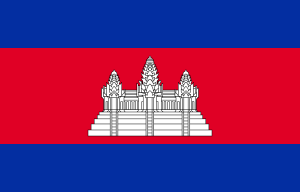Language/Central-khmer/Grammar/Personal-Pronouns
Central Khmer personal pronouns are an essential part of the language. As a beginner, it's crucial to learn the subject pronouns and object pronouns to express oneself correctly. Whether you want to talk about yourself, someone else or something else, using the appropriate personal pronoun is essential.
After mastering this lesson, these related pages might interest you: Describing Actions and States & Basic Word Order.
Subject Pronouns
Subject pronouns are the ones we use when the pronoun is the subject of the sentence. In Central Khmer, the pronouns are as follows:
| Central Khmer | Pronunciation | English |
|---|---|---|
| ខ្ញុំ (khnhom) | [kʰɲom] | I / me |
| អ្នកខ្ញុំ (nek khnhom) | [neːk kʰɲom] | you (singular) |
| គាត់ (kat) | [kaːt] | he / him / she / her / it |
| យើង (yerng) | [jəːŋ] | we / us |
| អ្នកយើង (nek yerng) | [neːk jəŋ] | you (plural) |
| ពុទ្ធ (pot) | [poat] | they / them |
As you can see, the pronoun "អ្នកខ្ញុំ" (nek khnhom) is used for "you" in a formal context. It is important to note that the pronunciation of the two pronouns that mean "you" is slightly different. The sound "ne" in "អ្នកខ្ញុំ" (nek khnhom) is longer than the sound "ne" in "អ្នកយើង" (nek yerng).
Let's see some examples:
- ខ្ញុំបានធ្វើការ។ (knhom baan dweh kaar.) - I did the work.
- អ្នកខ្ញុំបានទទួលប្រាក់ពីខ្ញុំ។ (nek khnhom baan tuk toul braak pi khnhom.) - You received money from me.
- គាត់ចង់ទៅមកហើយ។ (kat jang tov muk hoy.) - He / She wants to come.
Object Pronouns
Object pronouns are the ones we use when the pronoun is not the subject of the sentence. In Central Khmer, the pronouns are as follows:
| Central Khmer | Pronunciation | English |
|---|---|---|
| ខ្ញុំ (khnhom) | [kʰɲom] | me |
| អ្នក (nek) | [neːk] | you |
| គាត់ (kat) | [kaːt] | him / her / it |
| យើង (yerng) | [jəːŋ] | us |
| អ្នកយើង (nek yerng) | [neːk jəŋ] | you (plural) |
| ពុទ្ធ (pot) | [poat] | them |
Let's see some examples:
- ខ្ញុំគឺរីករាយនៅក្នុងផ្ទះ។ (knhom ker rikrei nov knung pteh.) - You saw me yesterday at home.
- ញុំចង់ទៅមកហើយ។ (noung jang tov muk hoy.) - I want to come.
- អ្នកចង់អូនជួបគ្នាទេទែ? (nek jang ouy jupnhaoj mnear takae?) - Do you want to talk to me?
Possessive Pronouns
Possessive pronouns are pronouns that demonstrate possession or ownership. In Central Khmer, they usually come after the noun or subject they are referring to. They are formed by adding the possessive particle "របស់" (rap sor) to a subject pronoun.
Here are the possessive pronouns in Central Khmer:
| Central Khmer | Pronunciation | English |
|---|---|---|
| ខ្ញុំរបស់ខ្ញុំ (khnhom rap sor khnhom) | [kʰɲom rap sor kʰɲom] | mine |
| អ្នករបស់អ្នក (nek rap sor nek) | [neːk rap sor neːk] | yours |
| គាត់របស់គាត់ (kat rap sor kat) | [kaːt rap sor kaːt] | his / hers / its |
| យើងរបស់យើង (yerng rap sor yerng) | [jəːŋ rap sor jəːŋ] | ours |
| អ្នកយើងរបស់អ្នកយើង (nek yerng rap sor nek yerng) | [neːk jəŋ rap sor neːk jəŋ] | yours (plural) |
| ពុទ្ធរបស់ពុទ្ធ (pot rap sor pot) | [poat rap sor poat] | theirs |
Let's see some examples:
- ស៊ីប្រាថ្នាក់របស់ខ្ញុំស្រឡាញ់ពីផ្ទះរបស់ខ្ញុំ។ (sibpratanak rap sor khnhom sralanh pi pteh rap sor khnhom.) - My classmates came from my house.
- ចំពោះរយៈពេលវិញរបស់យើងមានវិញ។ (jom paar oy pail vea vinh rap sor yerng mun vin.) - We have another meeting next week.
- អ្នកគឺគ្រួសាររបស់អ្នកមិនត្រូវតែធ្វើតែជួយមែនទេ។ (nek ker kruosar rap sor nek min trov tae tvea jea mean te.) - Your family shouldn't always help you.
Practice Exercise
Now, let's practice what you've learned so far!
- Translate into Central Khmer:
1. She did the homework. 2. I want your car. 3. Their house is beautiful. 4. We have a cat. 5. They gave us money.
- Translate into English:
1. ខ្ញុំស្រាវជាម្ចាស់។ (knhom sraa jear meanchas.) 2. ស្ថានពលរបស់គាត់មានភ្លេច។ (sthinphal rap sor kat mun phlech.) 3. អ្នកខ្ញុំបានមានបងប្អូន។ (nek khnhom baan mun bangboun.) 4. ដើ

